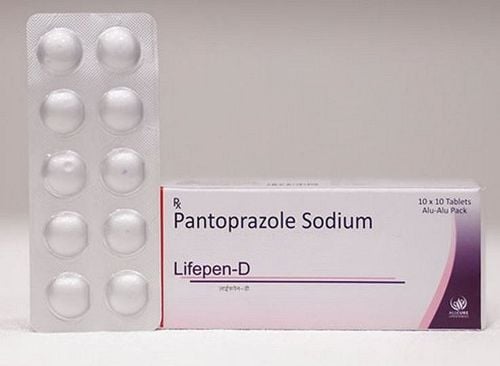This is an automatically translated article.
Posted by Doctor of General Surgery, Vinmec Central Park International General Hospital.Esophageal cancer is the 8th most common cancer in the world and has the poorest prognosis because when clinically detected, the tumor is often at an advanced stage.
1. What is esophageal cancer?
Esophageal cancer begins in the cells in the lining of the esophagus. Over time, cancer can penetrate deeper into the layers of the esophagus wall, and because the esophagus does not have a serosa, the tumor quickly invades nearby organs.Cancer cells that can spread by disrupting the original tumor can also invade blood vessels or lymphatic vessels around the esophagus, rapidly metastasize to lymph nodes even when the disease is new, and metastasize distantly. throughout the body tissues such as lungs, liver, bones.
2. What is the frequency of esophageal cancer?
The American Cancer Society estimates for esophageal cancer in 2016 are:Approximately 16,910 new cases of esophageal cancer are diagnosed (13,460 in men and 3,450 in women) Approximately 15,690 cancer deaths esophagus (12,720 in men and 2,970 in women) The disease occurs 3-4 times more often in men than in women. The lifetime risk of esophageal cancer in the United States is about 1 in 125 in men and about 1 in 35 in women.
2. What symptoms does esophageal cancer cause?

Ung thư thực quản có thể gây ra cảm giác nuốt nghẹn, thức ăn vướng trong thực quản
Swallowing : Feeling of food getting stuck in the esophagus and possibly vomiting again. Swallowing gradually increases from solid to liquid food. Usually when there is choking, the disease is already in the late stage.
Vomiting : occurs when swallowing is obvious. Vomiting can occur during meals, right after eating. Vomit is food that has just been eaten without gastric juices, and there may be little blood in the vomit.
Increased salivation: When the patient swallows a lot, the saliva hardly reaches the stomach, so the patient always has to spit.
Weight loss: The patient is thin, exhausted, and anemic.
Other symptoms: Symptoms that the tumor has invaded beyond the esophagus: Shortness of breath; A cough; Choking; Hoarseness (A nice hoarse voice that doesn't go away within 2 weeks); Pain (pain when swallowing: heaviness, pressure behind the sternum when swallowing, chest or back pain, epigastric abdominal pain).
3. What causes esophageal cancer?
The cause of esophageal cancer is still unclear.Esophageal cancer occurs when the cells of the lining of the esophagus do not develop properly (mutations) in its DNA. Mutations cause cells to grow and divide uncontrollably. Abnormal cells accumulate in a tumor in the esophagus, which can grow to invade nearby structures and spread to other parts of the body.
There are two main types of esophageal cancer:
Squamous cell carcinoma: 95%. This type of esophageal cancer begins in the squamous cells that line the lining of the esophagus. It usually develops in the upper and middle part of the esophagus.
Adenocarcinoma: accounts for 2.5-8% of primary esophageal cancers. This type begins in the glandular tissue in the lower part of the esophagus where the esophagus joins the stomach.
Others: Very rare, less than 1%, including small cell carcinoma, melanoma, lymphoma, and sarcoma.
4. What are the risk factors for esophageal cancer?

Hút thuốc là là yếu tố làm tăng nguy cơ ung thư thực quản
Smoking Drinking alcohol A diet low in fruits and vegetables. Food and drinking water are high in nitrites and nitrates (which are the source of nitrosamines - carcinogens). Habit of eating and drinking a lot of hot foods and substances that cause friction on the lining of the esophagus. Obesity Gastroesophageal Reflux (GERD) Barrett's esophagus Untreated Cardiac Spasms Plummer-Vinson syndrome: common in women, hypochromic anemia, atrophic glossitis, esophagitis with choking. Esophageal diverticulum Chemical burns to the esophagus Radiation therapy to the chest or upper abdomen
>> See also: Update on risk factors for esophageal cancer (Part 1) – Posted by Master, Doctor Mai Vien Phuong - Department of Examination & Internal Medicine - Vinmec International General Hospital Central Park
5. What are the complications of the disease?
As esophageal cancer progresses, it can cause complications such as: Esophageal obstruction: The cancer can make it difficult or impossible for food or liquid to pass through your esophagus; Pain; Bleeding: Although bleeding is usually gradual, oozing it can be sudden and severe.6. How is esophageal cancer diagnosed?
Tests and diagnostic procedures for esophageal cancer include:Endoscopic X-ray. Helps to accurately determine the location and shape of the tumor, the degree of narrowing of the esophageal lumen, ulceration and wart of the tumor surface. Endoscopy also allows biopsy of the tumor to confirm the diagnosis. The following tests contribute to the assessment of the preoperative period: Endoscopic ultrasound; CT scan; PET scan; Laparoscopy, chest
7. How many stages of esophageal cancer are there?

Ung thư thực quản có 4 giai đoạn từ I-IV
Esophageal cancer has 4 stages from I - IV.
8. How is esophageal cancer treated?
Treatment options for esophageal cancer are selected based on the type of cancer cell, stage of the disease, your overall health and your requirements.Surgery: Surgical removal of the tumor can be used alone or in combination with other methods.
Endoscopic tumor resection: If the tumor is very small, limited to the mucosa of the esophagus, it will be resected endoscopically by mucosal resection (EMR) or submucosal method (ESD).
Surgery to remove part or all of the esophagus: In cases where the tumor extends beyond the mucosa, the esophagus is removed and reconstructed in several ways. Esophagectomy with lymphadenectomy offers a better prognosis, however, there are complications and surgical complications such as infection, bleeding, and anastomosis...
Esophageal resection can be performed. performed by open surgery or laparoscopic surgery. How surgery is performed depends on your general condition, experience, and the surgeon's forte. At Vinmec Central Park International General Hospital (HCMC), a new technique is applied – Robotic surgery with hand-held robots, applied to digestive, urological and gynecological surgeries. department. This method has many advantages compared to both classical laparoscopic surgery and robotic surgery with:
Instruments with surgical heads act as flexibly as wrist joints to help access narrow angles, increasing the possibility of dissection and less damage to the surrounding area compared with classical laparoscopic surgery; Automated endoscopes through voice, laser, eye tracking, ... help doctors actively control and have better vision and control, increase accuracy and safety in performing surgery ; With the advantage of compactness, robotic arm surgery is less invasive and has many advantages such as small incision, less pain, low risk of infection, thereby helping customers less blood loss during surgery, quick recovery; The cost is much lower than robotic surgery. Do Minh Hung - Head of General Surgery Department, has more than 25 years of experience in the field of General Surgery. Treatment of complications: When the disease progresses, there are complications of strangulation that can be performed:
Methods to relieve esophageal obstruction: Endoscopic transluminal stenting, esophageal-gastroesophageal bypass with intestines . Other options include radiation therapy, chemotherapy, laser treatment, and photodynamic therapy. Delivering nutrition: Opening the stomach or small intestine to the skin with a feeding tube, where nutrients are delivered directly to your stomach or small intestine. Chemotherapy: Chemotherapy drugs are often used before or after surgery in people with esophageal cancer. Chemotherapy can also be combined with radiation therapy. In people whose cancer has spread beyond the esophagus, chemotherapy may be used alone to help relieve signs and symptoms caused by the cancer.
Side effects of chemotherapy drugs depend on the drugs you are taking.

Thuốc hóa trị thường được sử dụng trước hoặc sau phẫu thuật ở những người bị ung thư thực quản
Side effects of radiation to the esophagus include sunburn reactions in the skin, painful or difficult swallowing, and random damage to nearby organs such as the heart and lungs.
Targeted therapy: Targeted therapy is a treatment that targets specific genes, proteins or tissue environments that contribute to cancer cell growth and survival. This method aims to prevent the growth and spread of cancer cells while limiting damage to healthy cells.
Alternative (palliative): Palliative therapy can help you cope with the symptoms of the disease and the side effects of cancer treatment. For example, people with esophageal cancer may experience pain from cancer treatment or from a growing tumor. Your doctor can work to control your pain by treating the cause or with medication. However, the pain can linger, and palliative therapy can help you cope. The methods can be acupuncture, massage, relaxation techniques.
9. How to prevent esophageal cancer?
You can take steps to reduce your risk of esophageal cancer:Quit smoking: If you don't use tobacco, don't start. Drink in moderation: If you drink, limit yourself to no more than 1 can of beer a day if you're female or 2 cans per day if you're male. Eat more fruits and vegetables: Add a variety of colorful fruits and vegetables to your diet. Maintain a healthy weight: If you're overweight or obese, here are strategies to help you lose weight slowly and steadily.

Ăn nhiều trái cây và rau quả để giảm nguy cơ ung thư thực quản
10. How to detect esophageal cancer early?
Early detection of esophageal cancer by screening. The purpose of screening is to detect cancer at an early stage, which can be completely cured, helping people live longer and healthier lives.At the moment there is no test and screening strategy. However, people at high risk for esophageal cancer, such as Barrett's esophagus, are often monitored closely for early and precancerous cancers.
See more: Package for screening and early detection of gastrointestinal cancer (esophagus - stomach - colon)
11. What is the prognosis of the disease?
Usually, esophageal cancer is a treatable but rarely curable disease because patients often arrive at a late stage. Patients with severe Barrett's esophagus and those with few cancerous cells have relatively successful outcomes.The overall 5-year average survival rate ranges from 5% to 30%. Outcomes are particularly low because patients often arrive at a late stage, when the cancer has spread. The prognosis for squamous cell carcinoma and adenocarcinoma is the same.
To register for examination and treatment at Vinmec Central Park International General Hospital, please call the hospital's number.
Please dial HOTLINE for more information or register for an appointment HERE. Download MyVinmec app to make appointments faster and to manage your bookings easily.













